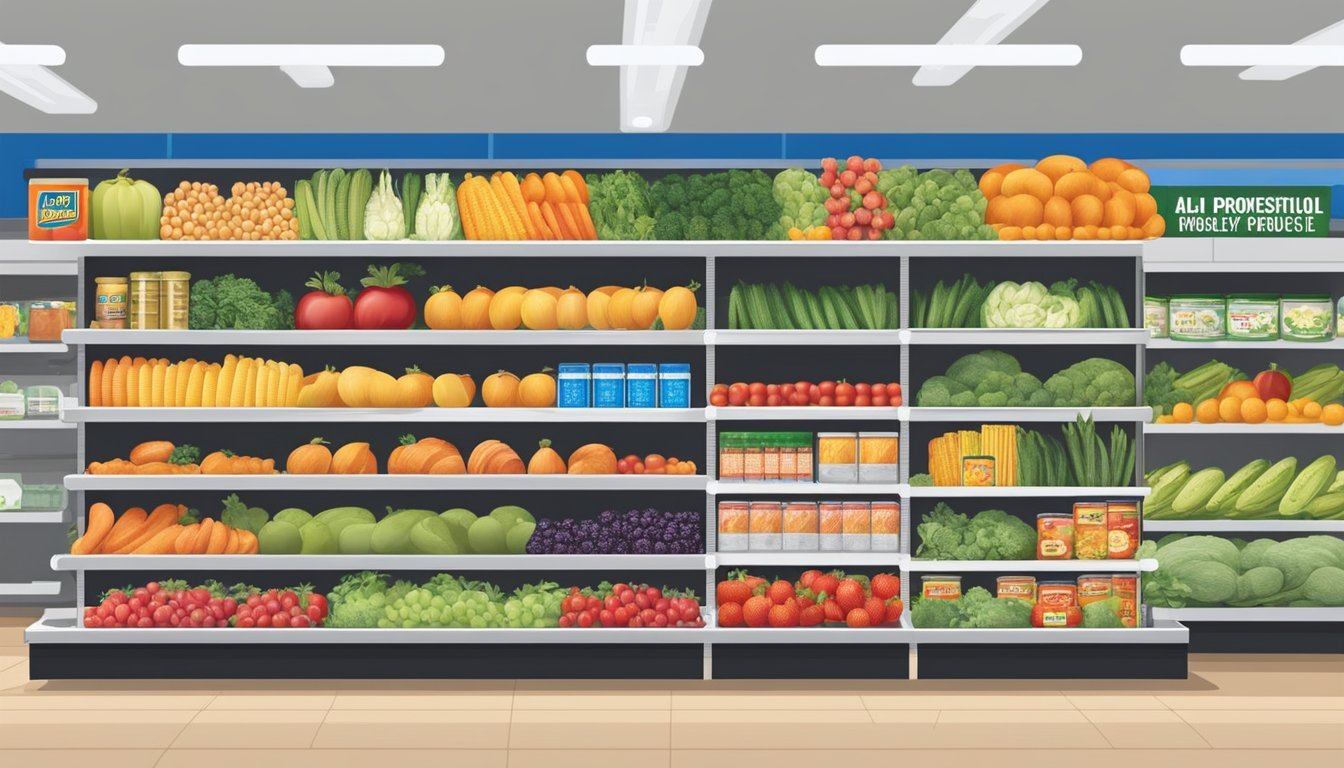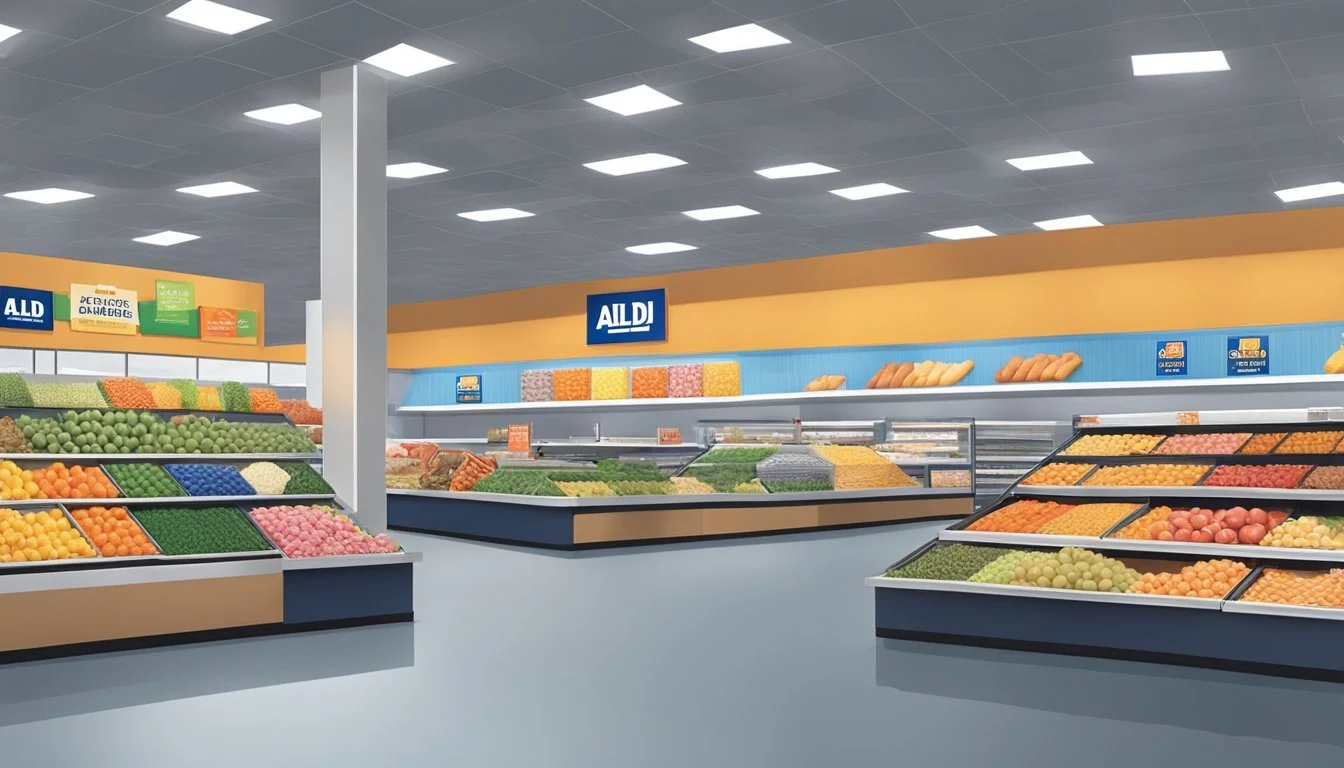Aldi vs Piggly Wiggly
Comprehensive Comparison of Grocery Store Value
Part of Our Grocery Store Guide with Details on Aldi and Piggly Wiggly
When assessing the value of grocery stores, shoppers often weigh the balance between affordability and quality. Aldi and Piggly Wiggly are two grocery chains that stand out in the American market. Aldi, an international discount supermarket chain, is known for its low prices and cost-saving store model. With an emphasis on private label brands and a no-frills shopping experience, Aldi frequently comes in as one of the most budget-friendly options.
On the other hand, Piggly Wiggly, with its strong Southern presence, offers a traditional grocery store atmosphere with an emphasis on regional brands and customer service. While prices may vary, with some reports suggesting that Piggly Wiggly can indeed be less expensive than retail giants like Walmart, it positions itself as a community-focused retailer that strives to give shoppers competitive pricing on everyday items. The grocery shopping experience at Piggly Wiggly is often personalized, with more emphasis on customer relationships.
The choice between Aldi and Piggly Wiggly may come down to individual preferences regarding shopping environment, product selection, and pricing priorities. The debate between which grocery store is better does not have a universal answer and is typically determined by the specific needs and expectations of the consumer.
Comparing Grocery Store Profiles
In exploring the profiles of Aldi and Piggly Wiggly, the section unpacks each store's foundation, market reach, and evolution within the grocery sector, focusing on how each caters to their respective markets.
History of Aldi
Aldi, short for Albrecht Discount, was established in Germany in 1946 by brothers Karl and Theo Albrecht. It split into Aldi Nord and Aldi Süd in 1960, the latter of which operates the Aldi stores in the United States. With its efficient low-cost model and focus on private labels, Aldi has established itself as a major global player in the grocery business.
History of Piggly Wiggly
Piggly Wiggly emerged as the first self-service grocery store, founded in 1916 by Clarence Saunders in Memphis, Tennessee. It revolutionized the grocery industry by allowing customers to pick their merchandise off shelves without the assistance of a store clerk, a novelty at the time that shaped the future of grocery shopping.
Aldi's Market Presence
Aldi operates over 10,000 stores in 20 countries, underscoring its significant presence in the global market. In the United States, Aldi's competitive pricing and expansion have positioned it against large supermarket chains like Trader Joe's and Walmart, as well as against regional stores such as WinCo and Sprouts Farmers Market. Aldi's no-frills shopping experience and emphasis on its own brands have helped it maintain affordability and consumer loyalty.
Piggly Wiggly's Market Presence
As a regional chain, Piggly Wiggly holds a strong presence in the Southern and Midwestern United States, with its store count reaching around 500. The brand prides itself on local community engagement and providing a friendly, personal shopping experience. Piggly Wiggly competes with larger grocery chains like Food Lion and Albertsons, as well as more localized players such as Jewel-Osco and IGA.
Price Comparison and Affordability
When comparing Aldi and Piggly Wiggly, understanding the pricing of everyday grocery items, the cost differences between private-label and national brands, and the impact of sales and discounts is crucial for customers looking to minimize their grocery bill.
Everyday Grocery Items Pricing
Aldi has been recognized for its low prices, particularly following a price comparison showing an increase from 66% to 69% in cost savings when compared to competitors. When it comes to everyday grocery items, shoppers can expect to find some of the lowest prices, outperforming major retailers like Walmart and Kroger in affordability. This suggests that customers prioritizing budget-friendly shopping would likely find Aldi to be the superior option for reducing their grocery bill.
Private-Label vs National Brands
Aldi's commitment to affordability extends to its private-label items. The retailer's strategy focuses on offering high-quality store brands at reduced prices, which is reflected in the cost of staples such as almond butter, where Aldi's pricing was $1.09 cheaper than Walmart's national brand equivalent.
Item Aldi Store Brand Price National Brand Price at Walmart Almond Butter $3.89 for 12 ounces $4.98 for 12 ounces
This price advantage for store brands over national brands is a common trend at Aldi, which could be an essential factor for consumers when assessing the overall value.
Sales and Discounts
While consistent low prices are the hallmark of Aldi, the subject of sales and discounts offers a more nuanced view of affordability. Aldi does not typically run traditional sales, preferring to offer low prices every day. In contrast, Piggly Wiggly may present more frequent sales events which could benefit customers depending on the timing and items they need; however, their average price levels tend to be higher than Aldi's.
Shoppers who closely track sales and discounts might find occasions where Piggly Wiggly's promotions offer cost savings over Aldi, but this is not always the case across the board. The Bureau of Labor Statistics suggests that price consistency can often save consumers more in the long run compared to periodic sales. This is a factor shoppers may consider when calculating their overall savings over time.
Product Selection and Availability
When comparing Aldi and Piggly Wiggly, shoppers will find that each store offers a distinct array of products that caters to their grocery needs, from fresh produce to frozen goods.
Produce and Meat Assortment
Both Aldi and Piggly Wiggly offer a range of fresh produce including fruits, vegetables, and salad items. Aldi’s produce section is prominently known for its affordable prices, while Piggly Wiggly prides itself on a selection that often includes locally-sourced options. When it comes to meat, customers at Piggly Wiggly might find a more varied selection, with offerings like custom cuts of beef and marinated ground beef. Aldi, while more limited in variety, typically presents notable deals on meat staples such as chicken, beef, and pork.
Bread, Dairy, and Frozen Sections
Bread and dairy products are essential, and both grocery stores have these covered. Shoppers at Aldi can find a consistent supply of basics like milk, eggs, and a compact, but sufficient, variety of bread and dairy goods. Piggly Wiggly may offer a broader selection, with different brands and possibly a specialty in regional dairy products. In the frozen sections, Aldi excels with an assortment of ready-to-cook meals, vegetables, and desserts, often under their own store brands. Piggly Wiggly's frozen selection is similar, though it may include more well-known brand names.
Specialty Items and Organics
For shoppers looking for organic foods, Aldi has made significant strides in expanding its organic offerings, providing options such as organic hummus, pantry staples, and canned goods. They are also known for their gluten-free and vegan specialty items. Piggly Wiggly may not have the same extent of organic selections as Aldi, but it generally holds a decent variety of condiments and specialty groceries. Both stores are becoming more receptive to the growing demand for organic and specialty items, though Aldi tends to have more consistent pricing across its range.
Shopping Experience and Store Atmosphere
When evaluating Aldi and Piggly Wiggly for their shopping experience and store atmosphere, one must consider store layout, customer service quality, and store cleanliness and maintenance. These factors combine to create the overall shopping ambiance and can deeply influence customer satisfaction.
Store Layout and Design
Aldi's store layout is typically uniform and straightforward, primarily designed for efficiency. They use a smaller footprint, and the aisles are arranged to lead shoppers through the store systematically. The focus is on maximizing space with private-label brands, resulting in a no-frills shopping experience that emphasizes cost savings over visual appeal. Meanwhile, Piggly Wiggly's design may vary since stores are independently owned. They often have a more traditional layout with a wider variety of national and regional brands. The design often aims to cater to local preferences, which can offer a more personalized shopping experience.
Customer Service Quality
In the realm of customer service, Aldi is known for its speed and efficiency. With a streamlined checkout process, Aldi maximizes throughput but might not emphasize individualized customer interactions. Alternatively, Piggly Wiggly takes pride in their customer relations, often highlighting a friendly, community-focused approach. Consumer reports suggest that Piggly Wiggly staff may be more likely to engage with customers, assist with shopping lists, or provide recommendations for store-prepared foods or baked goods.
Cleanliness and Maintenance
Cleanliness is a critical factor for both Aldi and Piggly Wiggly. Aldi has a systematic approach to store maintenance, with a consistent and clean store environment across its locations. This contributes to the efficient, no-nonsense atmosphere of the shopping experience. Piggly Wiggly stores, due to their individual ownership, can vary in terms of cleanliness and maintenance. However, the expectation set by the brand is for well-maintained stores that provide a clean and inviting environment for their shoppers. Both stores strive to ensure that the shopping areas and particularly the food quality and safety meet high standards, reflecting their commitment to customer satisfaction.
Additional Services and Features
Aldi and Piggly Wiggly supermarkets offer a variety of services and features that aim to enhance the shopping experience. These range from specialized in-store departments to unique community programs. Here are the specific offerings from each store:
In-Store Departments
Aldi takes a minimalist approach to in-store departments. Typically, Aldi supermarkets do not offer pharmacies or banks within their stores. Their focus is on providing a streamlined selection of goods, which includes a variety of store brand products known for their cost-effectiveness. The layout is such that the original boxes are used for shelving, which simplifies the restocking process and lowers overhead.
Piggly Wiggly, on the other hand, provides a wider array of departments. Depending on the location, customers may find pharmacies and bank services inside Piggly Wiggly stores, offering a more one-stop-shop experience.
Special Programs and Promotions
Aldi is known for its budget-friendly options and often has weekly promotions on grocery items. Their promotions extend to their store brand products, leading to significant savings for customers without compromising on quality.
Piggly Wiggly frequently runs specials and promotions that are community-centric, including discounts on local produce and other region-specific items. They often have loyalty programs offering savings and benefits to repeat customers.
Community Involvement
Community involvement is a key aspect where both supermarket chains try to excel. Aldi operates with a corporate philosophy that emphasizes efficiency and sustainability, and as a result, has been involved in various initiatives that benefit both the environment and the community.
Piggly Wiggly, with its strong community roots, is known for its involvement in local communities. As a chain, it encourages individual stores to take part in local events and charitable causes, fostering a strong connection with their customer base.
Consumer Impressions and Brand Loyalty
In the competitive landscape of grocery stores, consumer impressions and brand loyalty are shaped by customer feedback as well as by the perception of brand reputation and trust. Shoppers frequently weigh their experiences, taking into account the quality of food, customer service, and value for money.
Customer Feedback and Reviews
Aldi: Customer satisfaction with Aldi has risen, now tying with other supermarkets concerning quality and freshness, with 56% of customers highly satisfied. Their prices are generally considered competitive, and their private-label items, such as the Aldi-exclusive brands, often match the quality of national brands. Some customers note Aldi's smaller store layout can limit product variety but praise the cleanliness and the simple shopping experience.
Piggly Wiggly: Customer experiences with Piggly Wiggly stores suggest a solid performance in maintaining cleanliness, which is a critical aspect of consumer satisfaction. Despite facing competition from larger chains, Piggly Wiggly retains a loyal customer base, particularly in the South and Upper Midwest, where they are celebrated for their resilience in the market.
Brand Reputation and Trust
Aldi: Known for its competitive pricing strategy, Aldi's reputation for affordable food quality has made it a go-to for budget-conscious consumers. Aldi’s approach to retail, with a heavy focus on cost-saving measures while maintaining quality, has forged a strong brand reputation that contributes to the trust and loyalty of their customers.
Piggly Wiggly: As one of the first self-service grocery stores, Piggly Wiggly has a long-standing history with consumers, which adds to its brand trust. Their ability to remain steadfast amid retail competition is attributed to the trust they've fostered with their customer base, partly due to their consistent food quality and effective customer service.
Financial Insights and Industry Trends
This section examines the economic factors influencing consumer grocery shopping behavior and provides insights into the future of grocery retail.
Economic Impact on Shopping Habits
Inflation has been a key driver in altering customer spending patterns at grocery stores. As inflation impacts the cost of living, consumers increasingly seek value, with a marked shift towards budget grocers like Aldi. These retailers are gaining traction for their ability to keep the grocery bill more manageable. On the other hand, traditional chains such as Piggly Wiggly must adapt to maintain their customer base in an economy where price sensitivity is becoming more pronounced.
Grocery chains are also witnessing changes in shopping dynamics. The competition is not limited to other supermarkets such as Kroger, Walmart, or specialty stores like Trader Joe's. The grocery chain industry as a whole is contending with the growing trend of grocery shopping online, with convenience playing a significant role in consumer choices.
Future Outlook for Grocery Chains
The grocery chain industry's landscape is expected to continue evolving, with technology and consumer preferences shaping its trajectory. Aldi, known as a budget grocer, has been expanding aggressively to meet the growing demand for cost-effective shopping options. The company's growth strategy demonstrates a bullish outlook for discount supermarkets.
In contrast, Piggly Wiggly, while smaller compared to giants like Walmart or Kroger, showcases resilience by catering to local communities and offering personalized experiences. Its prospects hinge on differentiating from larger competitors and maintaining a strong local presence. Future success for grocery chains will likely be defined by innovation, adaptability, and an in-depth understanding of shifting consumer needs.







